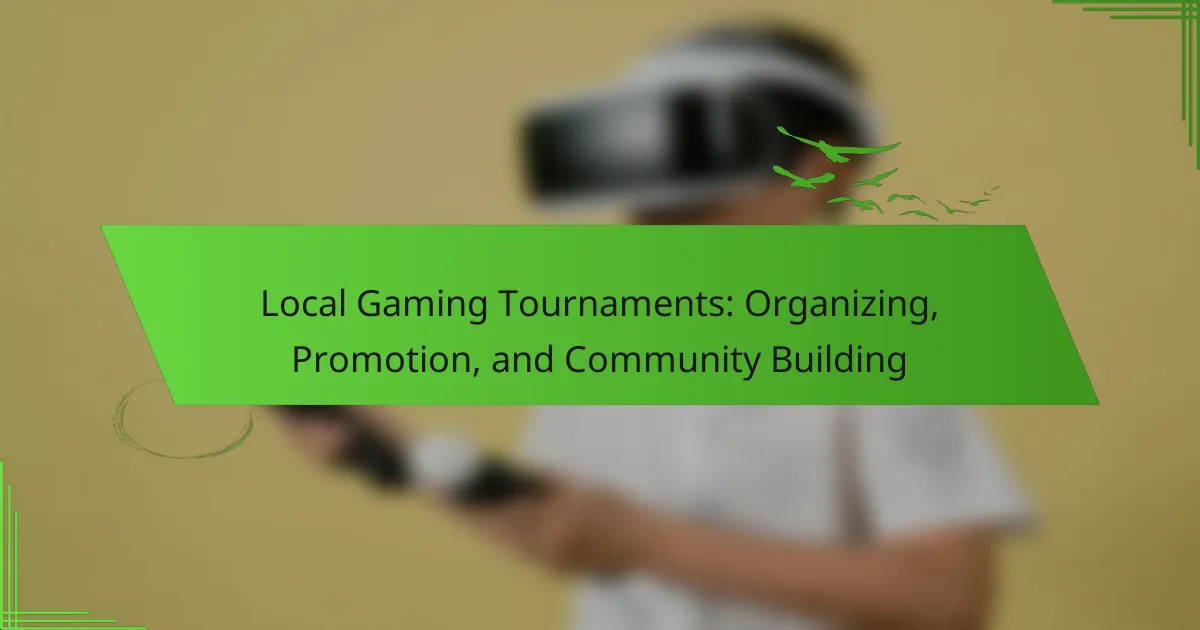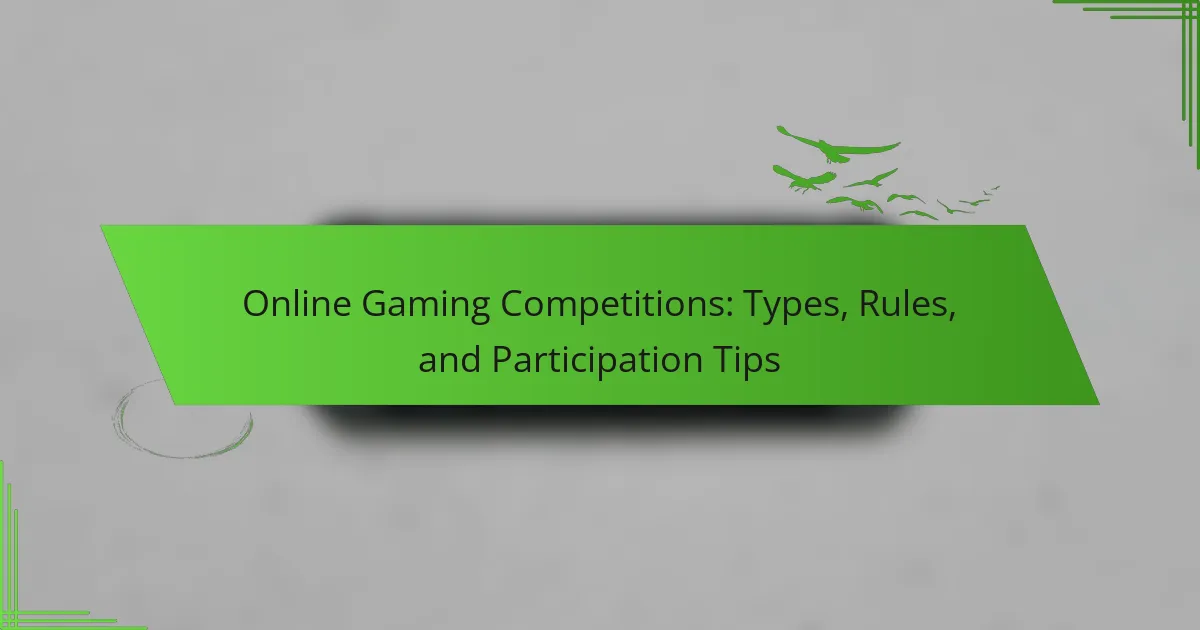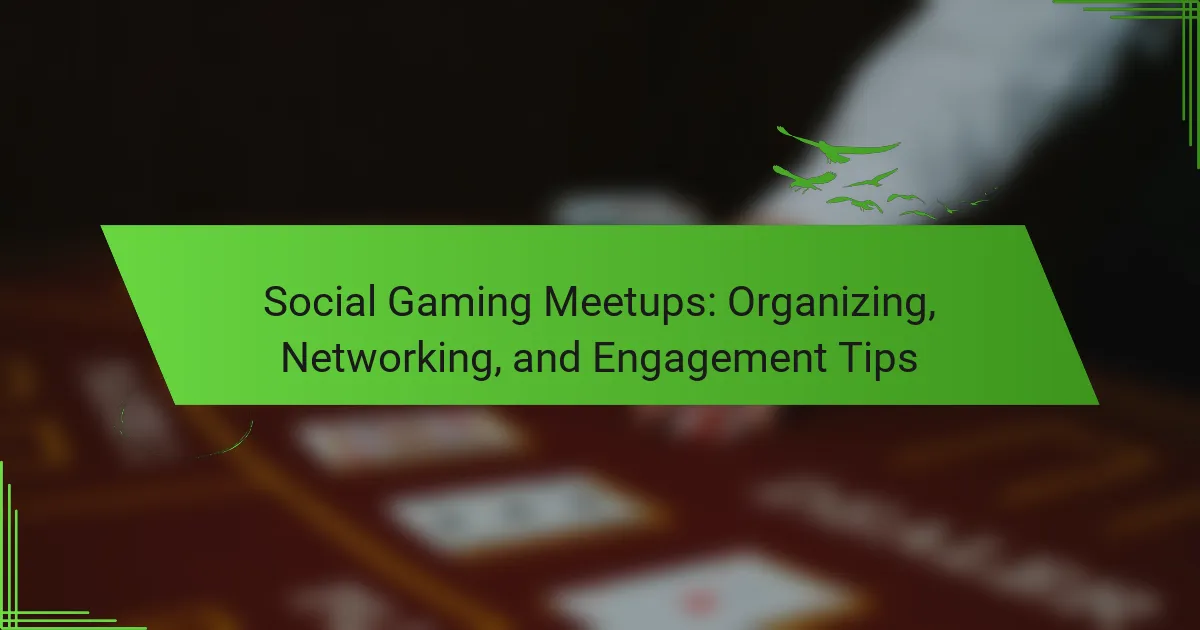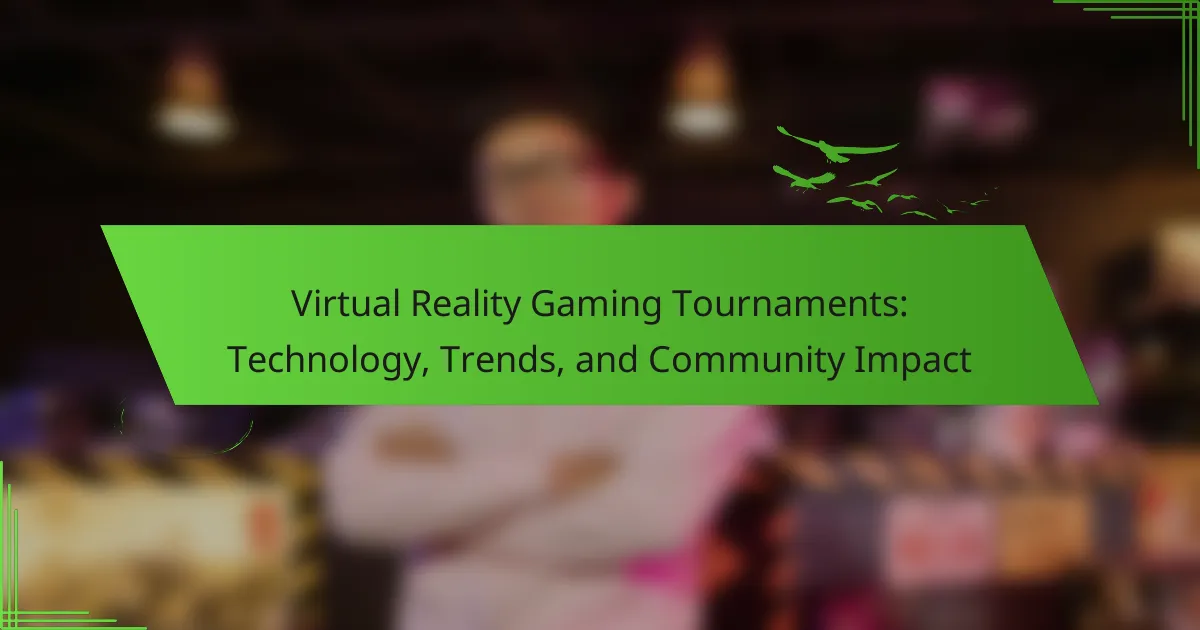Local gaming tournaments foster community engagement and friendly competition among players. This article covers essential steps for organizing a tournament, effective promotion strategies, and methods for building a strong gaming community. Learn how to select the right game, secure a suitable venue, and manage logistics while attracting participants through social media and local partnerships. Additionally, discover ways to create an inclusive atmosphere that encourages interaction and lasting connections among players.
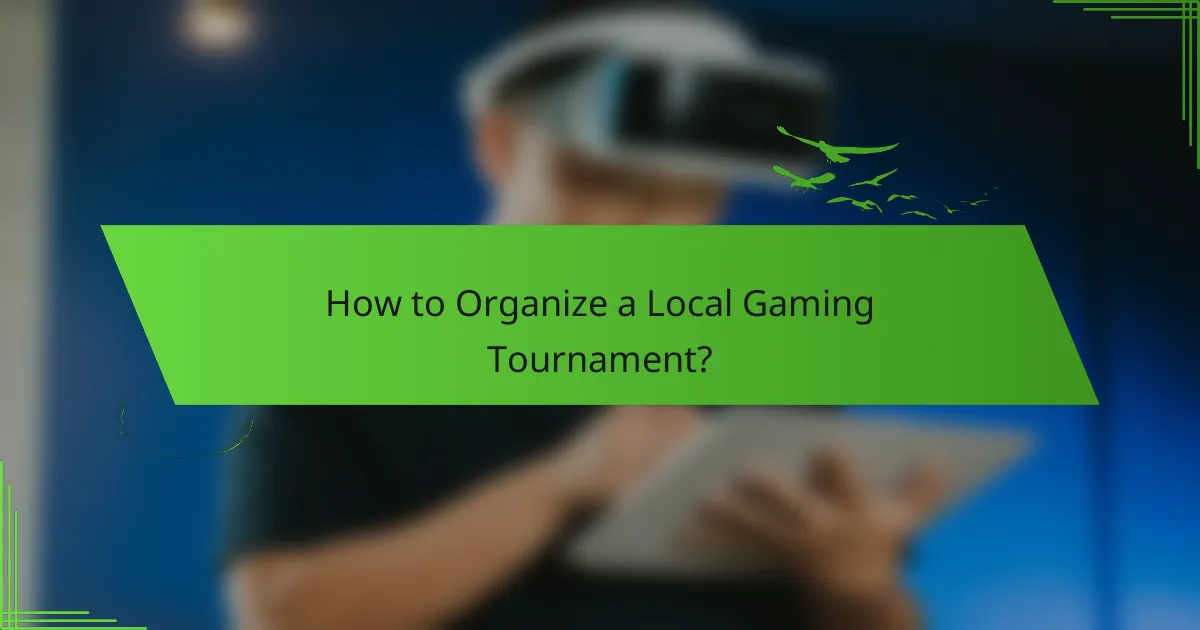
How to Organize a Local Gaming Tournament?
To organize a local gaming tournament, follow these key steps: define the game, choose a venue, set a date, promote the event, and manage logistics.
1. Define the Game: Select a popular game that attracts participants and fits the community’s interests.
2. Choose a Venue: Find a location with enough space, power, and internet access to host the tournament.
3. Set a Date: Pick a date that avoids major conflicts and allows ample time for promotion.
4. Promote the Event: Use social media, local gaming forums, and community boards to attract participants.
5. Manage Logistics: Ensure equipment is available, rules are clear, and staff is in place for smooth operations.
Engaging the community through feedback and involvement can enhance the tournament experience.
What Are the Key Steps in Planning a Tournament?
To plan a successful local gaming tournament, follow these key steps:
1. Define the tournament format and rules.
2. Secure a venue and set a date.
3. Promote the event through social media and local channels.
4. Register participants and manage logistics.
5. Execute the tournament and gather community feedback.
These steps ensure a well-organized event that fosters community engagement and excitement.
Which Venues Are Best for Hosting Gaming Events?
Local gaming tournaments thrive in venues that foster community engagement and provide essential resources. Ideal locations include community centers, gaming cafes, and esports arenas. Each venue should offer ample space, reliable internet, and accessibility for participants.
Community centers often have the advantage of being cost-effective and familiar to local gamers. Gaming cafes provide a social atmosphere and may already host smaller events. Esports arenas, while potentially more expensive, offer professional-grade equipment and a larger audience capacity.
Consider the venue’s proximity to public transport and accommodation options. This accessibility can increase participation rates and enhance the overall experience. Additionally, venues with a history of hosting successful events can attract more attendees and sponsors.
Ultimately, the best venue balances accessibility, atmosphere, and technical capabilities, ensuring a successful and engaging gaming tournament.
How to Set Rules and Regulations for Fair Play?
Establishing clear rules and regulations is essential for fair play in local gaming tournaments. Start by defining game mechanics, player conduct, and consequences for rule violations.
1. Create a comprehensive rulebook outlining game formats and scoring systems.
2. Set guidelines for player behavior, including sportsmanship and communication.
3. Specify penalties for infractions to ensure accountability.
4. Regularly review and update rules based on player feedback and tournament experiences.
These steps foster a competitive yet respectful environment, enhancing community engagement.
What Equipment and Technology Are Necessary?
To organize local gaming tournaments effectively, essential equipment and technology include gaming consoles, high-speed internet, and audio-visual equipment. Additionally, reliable tournament management software streamlines registration and match scheduling.
Key equipment:
– Gaming consoles (e.g., PlayStation, Xbox)
– High-speed internet connection (minimum 100 Mbps)
– Audio-visual equipment (cameras, microphones)
– Monitors (at least 24 inches)
– Tournament management software (e.g., Battlefy, Challonge)
This setup enhances participant experience and ensures smooth event operations.
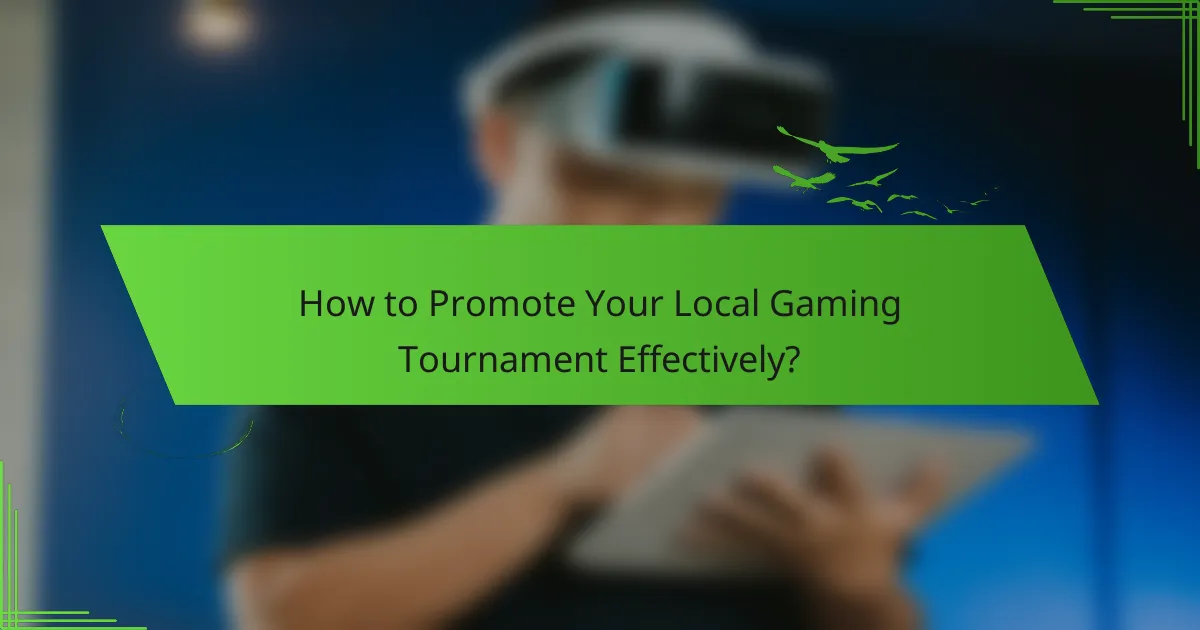
How to Promote Your Local Gaming Tournament Effectively?
To promote your local gaming tournament effectively, leverage social media, engage with the community, and offer incentives. Utilize platforms like Facebook and Twitter to create event pages and share updates. Collaborate with local gaming influencers to reach a wider audience. Organize engaging pre-event activities to build excitement. Consider offering prizes or discounts to participants to encourage sign-ups.
Which Marketing Channels Work Best for Gamers?
Local gaming tournaments thrive on effective promotion and community engagement. Key marketing channels that work best include social media platforms, local gaming forums, and community events.
Social media channels like Facebook and Instagram allow for targeted advertising to reach specific gamer demographics. Local gaming forums foster community connections and provide a platform for direct engagement with potential participants.
Additionally, collaborating with local gaming shops for in-store promotions can enhance visibility and attract participants. Email marketing campaigns can also be effective for reaching out to previous attendees and building anticipation for upcoming events.
Combining these channels creates a robust strategy that not only promotes the tournament but also builds a strong local gaming community.
How to Leverage Social Media for Promotion?
Utilizing social media effectively can significantly enhance the promotion of local gaming tournaments. Focus on engaging content, targeted ads, and community interaction.
1. Create captivating visuals and videos showcasing tournament highlights to attract attention.
2. Use platforms like Facebook and Instagram for targeted advertising to reach local gamers.
3. Engage with your audience through polls, Q&A sessions, and live streams to build community.
4. Collaborate with local influencers to expand your reach and credibility.
5. Share updates, schedules, and results regularly to keep participants informed and engaged.
6. Encourage user-generated content by hosting contests or challenges related to the tournament.
What Partnerships Can Enhance Visibility?
Collaborating with local businesses, schools, and gaming organizations can significantly enhance visibility for gaming tournaments. These partnerships can leverage shared marketing efforts, access broader audiences, and foster community engagement.
Local businesses can provide sponsorships or prizes, increasing their brand recognition while supporting the event. Schools can promote tournaments to students, encouraging participation and attendance. Gaming organizations can offer resources and expertise, enhancing the overall quality of the event.
These partnerships not only enhance visibility but also build a supportive gaming community, creating a positive environment for players and spectators alike.
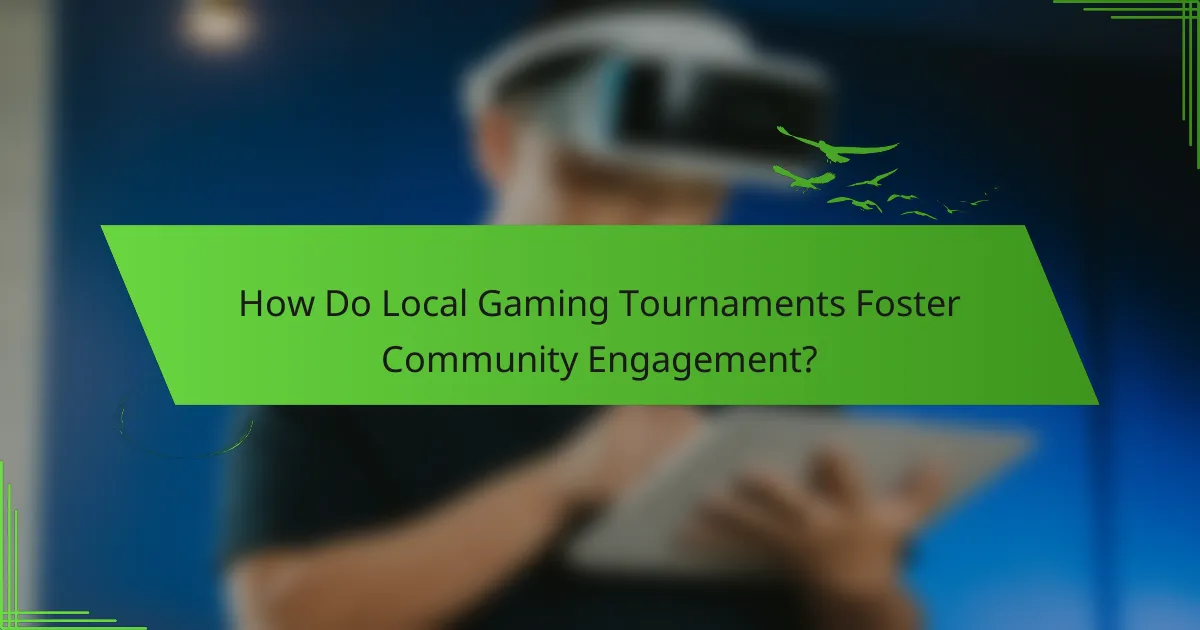
How Do Local Gaming Tournaments Foster Community Engagement?
Local gaming tournaments significantly enhance community engagement by bringing players together in a shared environment. They foster social interaction, teamwork, and friendly competition, creating lasting relationships among participants.
These events often include local businesses as sponsors, which strengthens community ties and promotes local economies. Additionally, tournaments provide a platform for players to showcase their skills, encouraging personal growth and development within the gaming community.
Moreover, tournaments can be tailored to various skill levels, making them accessible to a wider audience. This inclusivity helps to cultivate a diverse gaming culture, enriching the overall experience for all involved.
What Are the Benefits of Community Involvement?
Community involvement through local gaming tournaments enhances social connections, fosters teamwork, and promotes skill development. Participants experience increased engagement, leading to a stronger sense of belonging. Organizing these events encourages collaboration among local businesses, creating opportunities for sponsorship and promotion. Additionally, tournaments can boost local economies by attracting participants and spectators, thereby increasing foot traffic and sales for nearby establishments.
How to Create a Welcoming Atmosphere for Participants?
To create a welcoming atmosphere for participants, focus on accessibility, engagement, and community spirit. Ensure the venue is comfortable and offers necessary facilities. Use inclusive language in promotions to encourage diverse participation. Organize icebreaker activities to foster connections among attendees. Provide clear communication about the event schedule and rules to enhance participant confidence.
Which Activities Can Encourage Networking Among Gamers?
Local gaming tournaments can significantly enhance networking among gamers. These events foster connections through competitive play, shared interests, and community engagement.
Organizing tournaments creates opportunities for gamers to meet face-to-face, share strategies, and form friendships. Promotion through social media and local gaming communities helps attract participants, increasing the event’s reach and impact.
Community building occurs as players collaborate, forming teams and alliances that extend beyond the tournament. Regular events can establish a sense of belonging, encouraging ongoing interaction among participants.
Ultimately, local gaming tournaments serve as a catalyst for networking, bringing together diverse gamers to build lasting relationships.

What Unique Attributes Set Local Gaming Tournaments Apart?
Local gaming tournaments stand out due to their community focus, accessibility, and grassroots promotion. They foster local connections and encourage participation from diverse skill levels. Unique attributes include personalized event experiences, local sponsorships, and the ability to showcase regional talent. These tournaments often create a welcoming atmosphere, enhancing player engagement and loyalty.
How Do Regional Preferences Influence Game Selection?
Regional preferences significantly shape game selection in local gaming tournaments. Different regions often have unique gaming cultures, influencing popular genres and game formats. For instance, some areas may favor competitive team-based games, while others lean towards casual multiplayer experiences.
Community engagement is vital for promoting tournaments, as local interests drive participation. Organizers often tailor events to reflect regional tastes, ensuring higher attendance and enthusiasm. This localized approach fosters a sense of belonging among participants, enhancing community building.
Additionally, regional demographics impact game selection. Younger audiences may prefer fast-paced action games, while older players might enjoy strategic or classic titles. Understanding these preferences allows organizers to curate a diverse game lineup that appeals to their target audience.
Ultimately, recognizing regional preferences can lead to more successful tournaments, increased player engagement, and a stronger community presence.
What Unique Formats Can Be Implemented to Attract Players?
Unique formats to attract players in local gaming tournaments include themed events, online qualifiers, and community challenges. These formats enhance engagement and participation.
Themed events, such as retro gaming nights, create a nostalgic atmosphere. Online qualifiers expand reach, allowing players from different regions to compete. Community challenges encourage local collaboration and foster friendships, creating a supportive gaming environment.
Incorporating these unique formats can significantly boost attendance and player satisfaction.
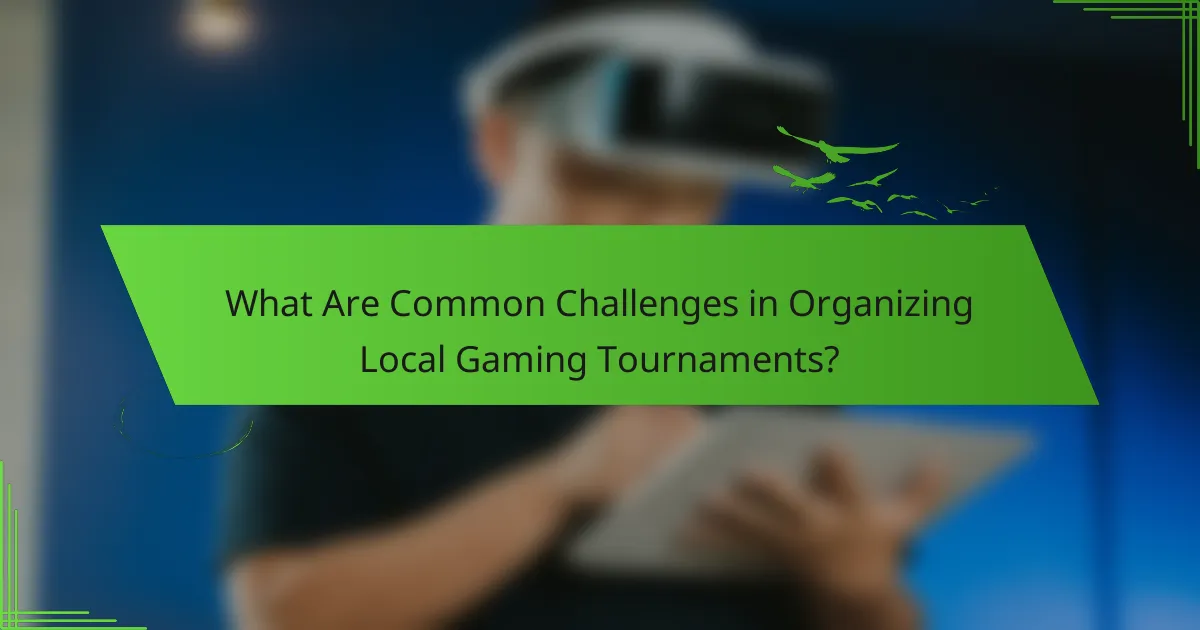
What Are Common Challenges in Organizing Local Gaming Tournaments?
Common challenges in organizing local gaming tournaments include securing adequate venues, attracting participants, and managing logistics. Venues often have limited availability and may require specific setups. Promoting the event effectively is crucial to ensure sufficient turnout, which can be difficult in competitive markets. Additionally, coordinating schedules, equipment, and rules can overwhelm organizers, especially if they lack experience. Engaging the gaming community and maintaining interest post-event can also pose significant hurdles.
How to Address Registration and Participation Issues?
To address registration and participation issues in local gaming tournaments, ensure clear communication and streamlined processes. Simplify registration forms and provide multiple registration platforms to accommodate different preferences.
Promote the tournament through social media and community channels to reach a wider audience. Engage local gaming communities by collaborating with gaming shops or online forums to boost participation.
Monitor feedback from participants to identify barriers and improve future events. Offering incentives, like prizes or recognition, can also enhance engagement and encourage more players to register.
What Are the Risks of Poor Tournament Management?
Poor tournament management can lead to several risks, including participant dissatisfaction, financial losses, and damage to community reputation. Ineffective organization may result in scheduling conflicts and inadequate resources, which frustrate players. Additionally, lack of clear communication can cause confusion, leading to low attendance and engagement.
Financially, mismanagement can lead to overspending or underestimating costs, jeopardizing the tournament’s sustainability. Furthermore, a poorly executed event can tarnish the reputation of the organizing body, making future tournaments less appealing. Ensuring proper planning and execution is essential to mitigate these risks and foster a positive gaming community.

What Rare Attributes Can Enhance the Tournament Experience?
Rare attributes that can enhance the tournament experience include unique venue themes, exclusive merchandise, and personalized player interactions. These elements create memorable experiences and foster community engagement. Unique venue themes can attract diverse audiences, while exclusive merchandise builds a sense of belonging. Personalized player interactions enhance participant satisfaction and encourage repeat attendance.
How Can Special Guest Appearances Impact Attendance?
Special guest appearances can significantly boost attendance at local gaming tournaments by attracting fans and enhancing the event’s appeal. High-profile guests often draw their followers, creating excitement and a sense of exclusivity. Additionally, their participation can increase media coverage and social media engagement, further amplifying visibility. Events featuring special guests may also foster community connections, encouraging more players and spectators to participate. Overall, leveraging special guests can transform a local tournament into a memorable experience that resonates within the gaming community.
What Innovative Prize Structures Can Attract Competitors?
Innovative prize structures can attract competitors by offering unique rewards and fostering community engagement. Consider tiered prizes that increase with participation, encouraging more players to join. Another approach is to include experiential rewards, such as exclusive gaming sessions with top players, enhancing the tournament’s appeal. Additionally, integrating local partnerships can provide prizes that resonate with the community, such as gift cards to local businesses or exclusive merchandise. These strategies not only enhance competitor interest but also strengthen community ties.
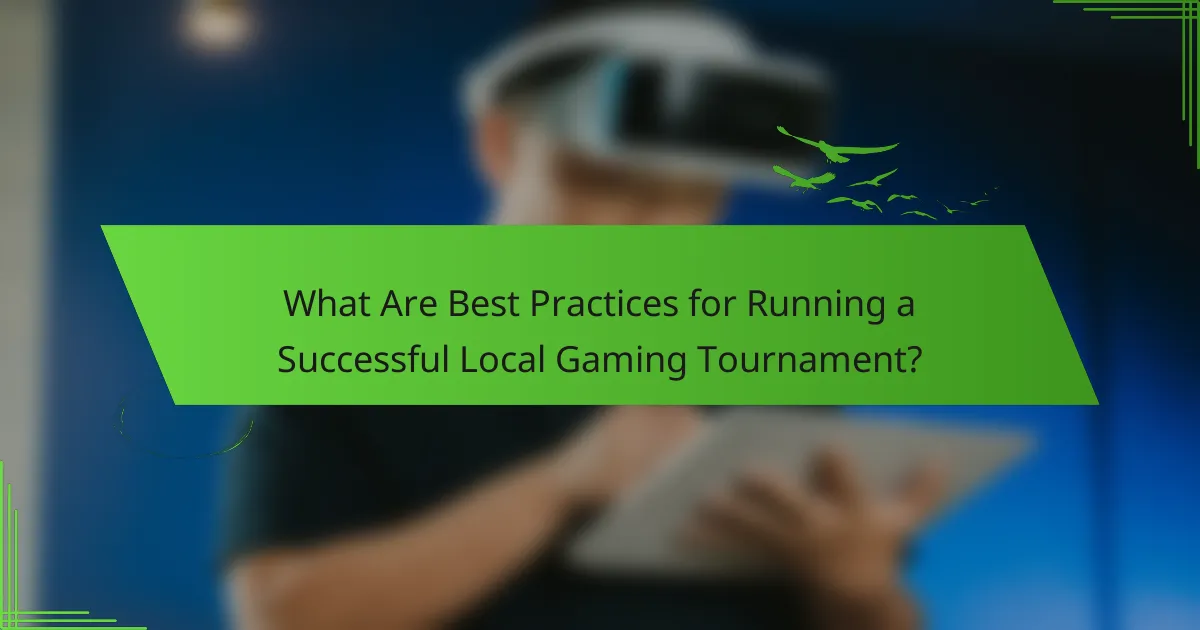
What Are Best Practices for Running a Successful Local Gaming Tournament?
To run a successful local gaming tournament, focus on organization, promotion, and community engagement.
Begin by selecting a popular game that attracts a diverse player base. Secure a venue that accommodates your expected attendance and provides necessary equipment. Create clear rules and structure for the tournament to ensure fair play.
Promote the event through social media, local gaming communities, and flyers. Engaging visuals and compelling messaging can attract participants. Consider partnering with local businesses for sponsorships, which can enhance visibility and provide prizes.
Foster community building by encouraging interaction among players. Create a welcoming atmosphere and consider hosting post-tournament activities to strengthen connections. Collect feedback after the event to improve future tournaments and maintain community interest.
What Expert Tips Can Ensure Smooth Operations?
To ensure smooth operations for local gaming tournaments, focus on meticulous planning and community engagement. Establish clear rules and schedules, and utilize social media for promotion. Collaborate with local gaming communities to enhance participation and support. Regularly gather feedback to improve future events.
What Common Mistakes Should Be Avoided?
To avoid common mistakes in organizing local gaming tournaments, prioritize planning and community engagement.
Firstly, neglecting to define clear objectives can lead to disorganized events. Set measurable goals to guide your planning. Secondly, failing to promote the tournament effectively limits participation. Utilize social media and local gaming communities for outreach.
Additionally, overlooking player feedback can hinder future events. Collect and analyze participant input to improve experiences. Lastly, underestimate logistical details, such as venue capacity and equipment needs, can disrupt the tournament flow. Ensure thorough preparation to accommodate all participants.
How to Gather Feedback for Future Improvements?
Gather feedback through surveys, social media, and direct conversations. These methods enhance local gaming tournaments by identifying strengths and areas for improvement.
1. Conduct surveys post-event to gather participant insights.
2. Utilize social media platforms for real-time feedback.
3. Host focus groups with community members for in-depth discussions.
4. Encourage open communication during tournaments for immediate feedback.
Implementing these strategies fosters community engagement and drives future improvements.
